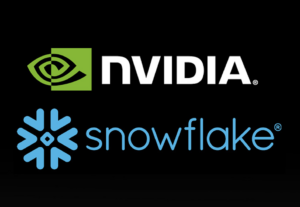Nvidia and Snowflake Integration Aims to Bridge the Generative AI and Data Security Gap

(cybermagician/Shutterstock)
As companies begin leveraging generative AI to build custom applications, ensuring their data is securely governed during the development process is proving to be tricky.
Data entered into foundation LLMs is not secure, as several high-profile leaks have shown. A pop-up now greets ChatGPT users upon login with the admonishment: “Please don't share any sensitive information in your conversations.” One recent incident occurred when Samsung engineers shared lines of confidential code with ChatGPT to troubleshoot a coding problem, which led the company to ban the use of such chatbots last month.
What if instead of bringing your data to generative AI systems, you could bring generative AI to your data? That’s the idea behind a new integration between Snowflake and Nvidia that will make it easier to build custom generative AI applications using proprietary data within the Snowflake Data Cloud.
Nvidia CEO Jensen Huang and Snowflake CEO Frank Slootman discussed this approach during a fireside chat Monday evening at the Snowflake Summit 2023 in Las Vegas.
“A large language model turns any data knowledge base into an application,” Huang said to the crowded room.
“The intelligence is in the data,” Slootman attested.
This partnership will give enterprises the ability to use data in their Snowflake accounts to make custom LLMs for generative AI uses like chatbots, search, and summarization. Proprietary data, which can sometimes range from hundreds of terabytes to petabytes of raw and curated business information, remains fully secured and governed with no need for data movement, Nvidia asserted in a release.

Snowflake CEO Slootman and Nvidia CEO Huang discuss the partnership during a fireside chat moderated by Sarah Guo. (Source: Snowflake)
During a press briefing, Manuvir Das, Nvidia’s head of enterprise computing, explained that Nvidia views the potential of LLMs as akin to professional employees with years of company-specific experience.
“If [a company] could start with a large language model, but really produce a custom model for themselves, that has all of the knowledge that is specific to their company, and that is endowed with skills that are specific to what that company's employees do, then that would be a better option than just a generic foundational model,” he said.
Das says the key difference between foundation models and custom models is rooted in an enterprise’s unique data, often stored in data lakes and warehouses. He notes that Snowflake’s data warehousing capabilities combined with Nvidia’s strengths in AI infrastructure and software have positioned the companies to significantly advance the creation of custom enterprise models.
Nvidia’s NeMo framework is an end-to-end platform for building custom models and seems to be a cornerstone of this project, as Snowflake plans to host and run NeMo in its Data Cloud where its capabilities will be integrated alongside NeMo Guardrails, a feature that allows governance and monitoring of AI model behavior. NeMo provides a library of pre-trained foundation models, ranging from 8 billion to 530 billion parameters, which Snowflake customers can use as a starting point for further training, Das noted in the press briefing.
Snowflake offers a host of industry-specific data clouds including those for manufacturing, financial services, healthcare and life sciences, media and entertainment, and government and education, to name a few. The companies assert their collaboration will further enable customers to transform these industries by bringing customized generative AI applications to different verticals with the Data Cloud. “For example, a healthcare insurance model could answer complex questions about procedures that are covered under various plans. A financial services model could share details about specific lending opportunities available to retail and business customers based on specific circumstances,” Nvidia said in a release.
 Das noted that both Nvidia and Snowflake will share responsibility for the security of data used as training data. He said the integration work being done in this partnership is crucial for maintaining data security and is a key consideration. The NeMo engine will operate within the Snowflake Data Cloud which was designed to ensure computation on the data remains within boundaries set for each customer.
Das noted that both Nvidia and Snowflake will share responsibility for the security of data used as training data. He said the integration work being done in this partnership is crucial for maintaining data security and is a key consideration. The NeMo engine will operate within the Snowflake Data Cloud which was designed to ensure computation on the data remains within boundaries set for each customer.
Nick Amabile, CEO and chief consulting officer at data consultancy DAS42 told Enterprise AI in an email interview that this announcement is big news for enterprises: “Yesterday’s fireside chat was all about how enterprises need to shift their thinking from ‘bringing data to their apps’ to ‘bringing their apps to their data.’ This partnership will drastically increase the speed of enterprises to develop, train, and deploy AI models enabling them to bring new experiences to their customers and better productivity to their employees.”
Amabile cautioned that businesses still need to carefully consider where and how AI can impact their business before deciding where to invest, which is an area where a consulting firm may be useful in unpacking the complexity of how these technologies can be used to drive business value.
Alexander Harrowell, principal analyst for advanced computing for AI at technology research group Omdia, said in a statement that this partnership represents a large opportunity in the burgeoning generative AI sector.
“More enterprises than we expected are training or at least fine-tuning their own AI models, as they increasingly appreciate the value of their own data assets,” he said. “Similarly, enterprises are beginning to operate more diverse fleets of AI models for business-specific applications. Supporting them in this trend is one of the biggest open opportunities in the sector.”










